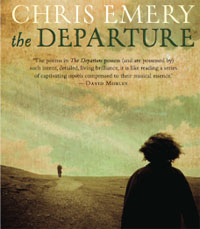When reading Chris Emery’s latest work, I am struck by the nostalgia of loading suitcases into a 5am taxi taking me to Gatwick airport; setting-out before most have even risen. There is a dawn-ness to his work; while there is darkness, the dark qualities of the pieces show remnisence and hindsight, bringing lightness to the load – this is not an abandoning, but an intrepid departure. But from what? Oneself? Reality? Or is it where the departure is to that really matters?
I am unfortunate in that I have not read Emery’s previous work. Duhig states that this apt title speaks of a shift in direction and range; however departure seems too strong a word to refer solely to Emery’s former writing style. For example, a quick bit of internet research reveals that Emery has always had a penchant for the long-line, and that this almost always pays off thanks to the colour and captivating imagery of the language present: ‘You’re often sat next to a dog turd with lots of beetles caring.’ (‘Dandelions’) ‘Up the pissy steps we find nostalgia’s vein-blue glamour. (‘M1 3LA’)
There are moments of great lucidity and philosophical insight in Emery’s poetry, and a vocabulary born from experience that doesn’t cry pretentious. There is grit, but not for its own sake, and a clean intelligence lies beneath “the dirt the dirt the dirt” of The Bukowskis that makes way for the brave political admonitions (‘The Destroyers Convention’ and ‘Guest Starring’). It is also nice to see a dialogue poem in the form of ‘Carl’s Job’; these are rare and, to me, pave a way forward in poetry. Emery’s excellent execution of this form delivers a haunting exchange of movie-talk, and shows the range of his literary prowess:“‘I’ve no further plans on killing’ I said. ‘Those days are done.’ / ‘Let me tell you, Bud,’ said Carl. ‘Those days are sitting here now.’”
Reading The Departure is to trespass on the cognitive acres of an astute mind. However, here in lies the departure from reality; some pieces suffer from perhaps too much ambiguity and leave the reader feeling as though they are surveying a dreamscape too immaterial to grasp. But I would hasten to add that I feel Emery earns the right to this as the rest of the collection contains a great deal of concrete – albeit fragmented as times. ‘Why bother pouring such weather / under the goose moon.’
So what is left once the departing has departed? The Departure also offers moments of journey and arrival, but they strike me more as re-imaginings and mental time travel; no true movement is made from the initial departing position. The final poem of the collection, a haiku entitled ‘Promenading’, tells of a show on the end of a pier. Whether the perspective is meant to be of looking out to the end of the pier, or of gazing out to sea from the end, is unclear. Whatever the case, The Departure leaves us as it greeted us, staring into the distance, into the water; a [SPOILER ALERT!] Capricornic sea-goat perpetually traversing into a new era. We only have one way to go, and it’s wet.
The Departure by Chris Emery, 2012, Salt Publishing. ISBN 978-1-907773-15-0. £12.99 Click here for more information.


Thank you, very much indeed. I’m truly flattered.